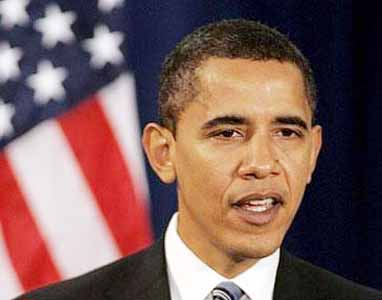Obama to slash executive pay as watchdog slams bail-out
 Washington - US President Barack Obama is expected to force a drastic cut in executive salaries at companies receiving government bail-outs, as a watchdog report on Wednesday slammed the administration's handling of the rescue effort to date.
Washington - US President Barack Obama is expected to force a drastic cut in executive salaries at companies receiving government bail-outs, as a watchdog report on Wednesday slammed the administration's handling of the rescue effort to date.
The Treasury Department will demand cuts in compensation from the top 25 executives at seven financial firms that are most indebted to the government, The Wall Street Journal reported Wednesday, citing people familiar with the matter.
Kenneth Feinberg, the Treasury official charged with overseeing salaries at bailed-out firms, will force executives to cut their total compensation packages by an average of 50 per cent, while salaries will be slashed 90 per cent.
The restrictions apply only to those firms that have yet to pay back government loans received since last year. They are American International Group, Citigroup and Bank of America, as well as carmakers General Motors, Chrysler and their two financial arms, GMAC and Chrysler Financial.
The move comes after widespread public anger over the government bail-outs and bonuses paid to Wall Street executives who share blame for pushing their industry to the brink of collapse in autumn 2008.
The cuts will apply to 175 executives. Feinberg will also force a series of corporate governance reforms at the seven companies, according to the reports.
"When it comes to these bonuses and excessive compensation, President Obama and Congress agree: enough is enough," said Nancy Pelosi, the top Democratic lawmaker in the House of Representatives.
The financial crisis led Congress to approve a 700-billion-dollar rescue package that went to banks in stress. A watchdog earlier Wednesday issued a scathing report on the government's handling of the so-called Troubled Asset Recovery Programme (TARP).
Special Inspector General Neil Barofsky, charged with overseeing the TARP programme, said a lack of transparency had fuelled public anger and "undermined" the government's credibility in dealing with the financial crisis.
The bail-outs encouraged banks to assume that they will get the same protection when the next financial crisis hits, Barofsky said. Banks will have an incentive to grow "too big to fail" unless Congress adopts far-reaching regulatory reforms in the coming year.
In his quarterly report, Barofsky slammed the government for not requiring banks to inform the public about how they were using the government money under the TARP.
"Treasury's actions in this regard contributed to damage the credibility of the programme and of the government itself," Barofsky wrote. "The anger, cynicism and distrust created must be chalked up as one of the substantial, albeit unnecessary, costs of TARP."
Barofsky did say there were "significant signs" that the programme had brought stability to the US financial sector, which stood on the brink of failure after investment bank Lehman Brothers declared bankruptcy in September 2008.
TARP was launched under former president George W Bush and approved by Congress in November 2008. Obama supported the effort and continued to use the money after taking office in January. (dpa)